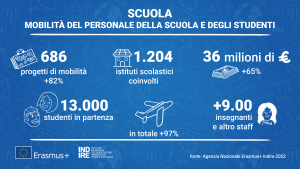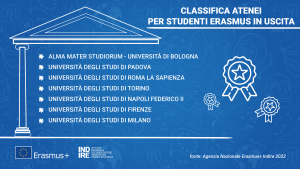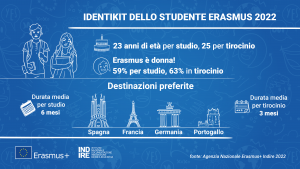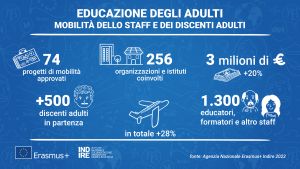indireinforma

The numbers of Italian participation in the Erasmus+ Programme have grown again. In 2022 there was a sharp increase in mobility activities and development of cooperation projects in Europe.
According to Flaminio Galli, director of the INDIRE’s Erasmus+ national agency, which manages the school, university and adult education sectors of the Programme in Italy: “Erasmus+ has demonstrated all its extraordinary vitality and its effective usefulness. Despite any situation or criticality, the Programme continues to fulfil its mission: to open doors, create connections, enrich people. We welcome the news that we have returned to pre-Covid levels, in terms of mobility and cooperation activities in projects. The future of Erasmus+ looks solid as it will continue to fund initiatives to promote inclusion, digital, environmental sustainability and a sense of citizenship and belonging to Europe”.
SCHOOL
The Call 2022 shows a sharp increase in the demand for Erasmus+ mobility in the school education sector. In fact, 686 mobility projects were approved (+82% compared to 2021) out of 762 applications received (+48%) and 1,204 institutions are involved, also considering consortia. The granted bursaries amount to over 36 million euros (+65%) and will allow learning activities abroad for almost 13,000 students and over 9,000 teachers and other school staff (overall +97% approved mobilities compared to 2021).
Erasmus+ accreditation
To date[1], 561 institutes are accredited for the school sector in Italy, 48 of which are coordinators of consortia. Sicily is in first place (followed by Lombardy, Campania and Lazio) with 60 institutes, of which 3 as coordinators of consortia. By the last deadline of 19 October 2022, the applications for the accreditation of educational institutions had almost doubled: 963, of which 20 for coordinators of consortia (+85%).
As regards key action 2, transnational cooperation, a total of 128 partnerships were approved under Call 2021 (out of 404 proposals received), for funding of over 18 million euros: 81 small-scale partnerships approved at the end of the two deadlines, out of 187 applications received (38 out of 71 in the first round, 43 out of 116 in the second); 47 were those for cooperation (out of 217 received in the single envisaged round). Also counting the partners involved in the 128 approved projects, we have a total of 197 Italian institutes and organizations involved and 395 foreign partners (63 from Spain, 62 from Turkey, 45 from Romania).
The 2022 Call is characterized by an increase in the received proposals for small-scale partnerships: 454, more than doubled compared to 2021 (+143%).
Overall, the action sees 598 proposals received (+48% compared to 2021), of which 56 partnerships have been approved for the moment [2], for a funding of almost 10 million euros, involving 97 Italian institutes and organizations and 215 foreign partners (30 from Spain, 28 from Turkey, 24 from Greece).
UNIVERSITY
Outgoing European mobility
under Call 2022, European mobility is the recipient of an increase in funds that goes from 74,566,474 euros to 105,743,564 euros (+ 41%), distributed among 263 higher education institutions. In detail, those for study mobility increased by 39.2%, going from 22,255 to 30,988, while those aimed at internships increased by 38.5%, from 6,625 to 9,175.
56% of the available budget goes to Lombardy, Lazio, Emilia-Romagna, Veneto and Campania. Among the universities, the Alma Mater University received the largest funding, equal to 7,199,990 euros, the University of Padua 5,150,718 euros, the Sapienza University of Rome 4,583,326 euros.
The total volume of funded mobility among students, teachers and staff reaches 45,180 (+36%, it was 33,116 in 2021). The number of scholarships intended for students alone increased from 28,880 to 40,163 (+39%).
Non-EU mobility
In 2022, after the stop linked to the Covid emergency, non-European mobility started again, with funding of 20,247,522 euros, intended for 4,606 beneficiaries including students, teachers, and incoming and outgoing staff. In 2020 (the last year of non-EU mobility before the stop due to the pandemic) the number of mobilities was 3,784 including outgoing and incoming students, teachers and staff.
Incoming mobility
In the context of incoming mobility, 188,000 chose Italy, of these 7,000 coming from non-EU areas. Among the Universities that welcomed the highest number of Erasmus students in the previous 2014-2020 Programme we find: Alma Mater of Bologna (15,194), Sapienza University of Rome (9,095), Politecnico di Milano (8,301), University of Padua (7,914 ) and University of Florence (6,809).
Erasmus student’s identikit
The Italian Erasmus student who has chosen Europe as a destination has an average age of 23, which becomes 25 for an intern. In 59% of cases, it is a female student, a value that rises to 63% when the purpose of the mobility is an internship in a company. Spain, France, Germany and Portugal are the countries with which the most exchanges for study are carried out, with an average stay of 6 months; preference is given, in order, to Spain, the United Kingdom, Germany and France for traineeships, which on average last 3 months.
COOPERATION PROJECTS
Cooperation projects in the field of higher education, which are part of the actions managed by the Agency, decreased from 41 to 25 in 2022, a decline due to a decrease in the budget available for the action which in 2021, the previous call, had benefited from an extraordinary allocation of 13,710,280 euros for the development of digital solutions during the Covid pandemic. The 2022 budget is instead 8,070,000 euros.
JEAN MONNET ACTION
Italy also stands out in the Jean Monnet activities for higher education, which promote active citizenship and European values and support policymaking at national and European level, through dialogue between academia, researchers, and political decision-makers; this type of action therefore acts as a vehicle of public diplomacy towards partner countries. Compared to the latest Call available, that of 2021, 41 projects have been approved in Italy in this field, followed by Ukraine with 38, Spain with 29 and the Russian Federation with 26.
CAPACITY BUILDING ACTION
Italy is also very active in reference to the Capacity Building in Higher Education (CBHE) Action, a measure aimed at modernizing the higher education systems of Third Countries not associated with the programme. Between 2015 and 2020, there were 87 projects coordinated by Italy, followed immediately by Spain with 101.
CALL 2023
The potential candidates for the Call 2023 are the 327 holders of ECHE, therefore Universities, Polytechnics, AFAM Institutes, High Schools for Linguistic Mediators and Higher Technical Institutes which are as many as 70. The budget available for Italy for the Higher Education sector in 2023 will be equal to 139,430,070 euros. Approximately 131 million are earmarked for European mobility, while approximately 8.3 million euros will be available for cooperation projects. The funds available for non-European mobility will be around 21 million euros, in line with the 2022 budget.
ADULT EDUCATION FIELD
An important breakthrough for this sector is the introduction of the mobility of adult learners, an activity that was no longer envisaged between 2014 and 2020. Eligible participants are adult learners with fewer opportunities, especially those with a low level of skills.
A total of 69 mobility projects were approved in the Call 2021 (out of 76 applications received), for a total of 2.8 million euros, which see the participation of around 400 learners and over a thousand trainers, educators and other staff involved in adult education.
The 2022 Call consolidates the interest in Erasmus+ mobility in the adult education sector, maintaining (and in some cases exceeding) the numbers of the previous year, strengthening the part linked to accredited planning. Overall, out of 93 applications received (+22% compared to 2021) 74 mobility projects were approved, involving, also considering the members of the 25 accredited consortia, 256 organizations and institutes. The granted funding amounts to over 3 million euros (+20%) and will allow learning activities abroad for more than 500 adult learners and around 1,300 educators, trainers, and other personnel in the sector (overall +28% approved mobilities compared to 2021).
ERASMUS+ ACCREDITATION
To date[3], 70 organizations and institutes are accredited in the adult education sector in Italy, 30 of which are coordinators of consortia. Piedmont ranks first with 11 organizations (followed by Lazio 10 and Sicily 9), of which 4 as consortium coordinators. At the last deadline of 19 October 2022, there was an increase in applications for the accreditation of AE organizations: 70, of which 9 for consortia coordinators (+49% compared to the applications received at the October 2021 deadline).
For transnational cooperation in the field of adult education, in the Call 2021, 68 small-scale partnerships were approved, 32 for cooperation, for a total of almost 13.5 million euros.
Also in this sector, the 2022 Call is characterized by an increase in the received proposals for small-scale partnerships: 265, +85% compared to 2021. While there is a negative decline with regard to cooperation projects.
Overall, the action sees 403 proposals received (+26% compared to 2021), of which 53 partnerships have been approved for the moment[4], for a funding of 6.5 million euros, involving 73 Italian institutes and organizations and 135 foreign partners (22 from Spain, 18 from Greece, 11 from Portugal).

